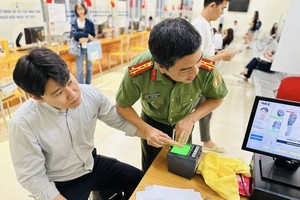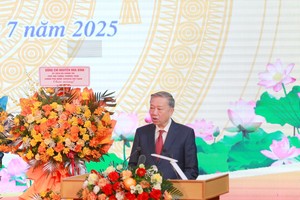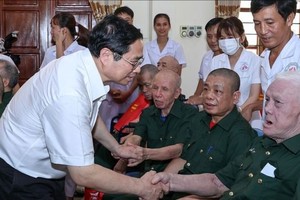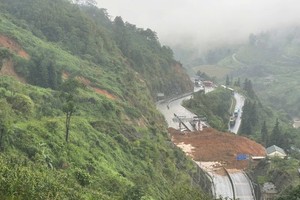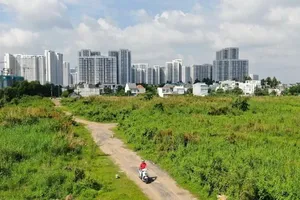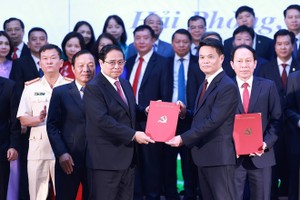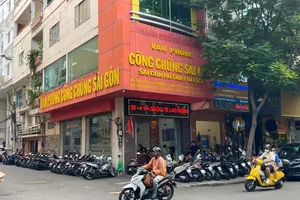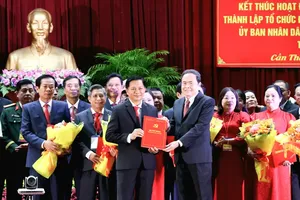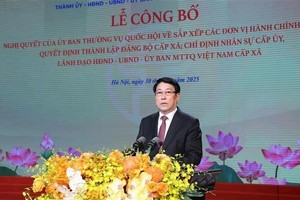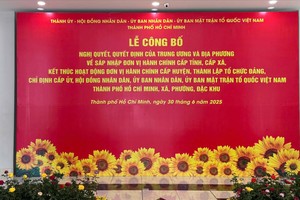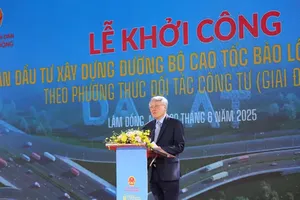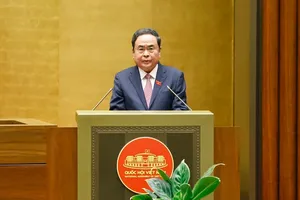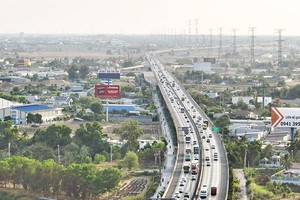The SGGP charity program “Nghia tinh Truong Son” (Sentimental Attachment for Truong Son Road) launched by the newspaper in 2009, has made its presence felt along the Truong Son Road within two years since its implementation.
The program’s management board has been successful in improving the living conditions of residents living on the Truong Son Road (also known as Ho Chi Minh Trail).
Under the program, much has been done by way of building houses, sanctuaries and shrines along the trail and along the borders separating Vietnam from Laos and Cambodia. All efforts under the program are aimed at reminding people of the past route taken by soldiers to liberate the South.
SGGP reporters held a talk with Tran The Tuyen, SGGP Editor-in-Chief on the occasion of the Truong Son Road-Ho Chi Minh Trail Festival, held for the first time in Hanoi on July 5.
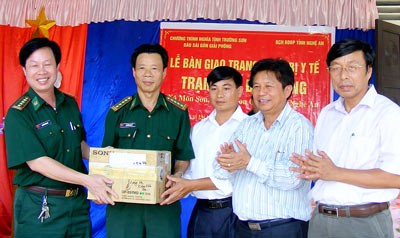
Tran The Tuyen, SGGP Editor-in-Chief (2nd, R) with donators offering medical equipment to Ban Bung Infirmary in Nghe An Province.(Photo:SGGP)
Tuyen told SGGP reporters that since July 27, 2009, the program had called upon people to support the program’s fund meant for poor families whose members had contributed towards the country’s liberation.
The fund has so far been used in many ways, like building houses for poor war veteran families, offering scholarships to children and building clinics and treating patients in remote areas free-of-charge.
Although the country is currently facing economic difficulties, the program has mobilized VND60 billion (US$3 million) till now, proving the resolve of people in supporting the Truong Son Road program.
Tuyen said that to date, the program has coordinated with local authorities and border guards to build nearly 700 houses in 14 cities and provinces across the Truong Son Road, as well as two infirmaries, three bridges and offered 1,300 scholarships.
In addition, the program has helped flood victims in the Central province of Quang Binh, Ha Tinh and Nghe An. It has also offered New Year gifts to residents in Thua Thien-Hue, Dac Lac and Nghe An provinces.
The program’s activities have brought back memories of the legendary Truong Son Road for readers across the country, Tuyen added.
During the two years of the program, he felt happy when he watched the happiness light up people’s faces when they received houses and children received scholarships.
The program has helped to alleviate peoples difficulties suffered during the war. Tuyen said that he was still not satisfied with what the program had accomplished and wished to do more. He said that many of the residents needs had still not been met. Therefore, the program would organize a second “Nghia Tinh Truong Son” gala concert to show gratitude for Truong Son.
Tuyen said that it was fair to say that it was the contributors who had generously donated to make the program a success. During the last two years the program had received great sympathy and support from society as a whole.
The Bank for Foreign Trade in Vietnam (Vietcombank) donated VND42 billion (US$2.1 million), Saigon Beverage Corporation (SABECO) and PepsiCo Vietnam donated VND5 billion (US$250,000) each and Vietnam Textile Garment Group (VINATEX), Vietnam Rubber Group, Phong Phu Corporation and Thien Tam Fund donated VND1 billion (US$50,000) each.
Tuyen said that “Nghia Tinh Truong Son” has become a meaningful program for residents in 14 cities and provinces across Truong Son Road. However, to expand further, the program needs support from central leaders and city authorities.
Tuyen hoped that the Truong Son Road- Ho Chi Minh Trail Festival would highlight the programs initiatives and raise more donations.
The SGGP program ‘Nghia Tinh Truong Son’ (Sentimental attachment for Truong Son Road) helps war heroes, war invalids, martyrs’ families, youth volunteers and the poor ethnic people that live along the provinces of Truong Son Road. During the resistant war against US invaders, the provinces along Truong Son (Ho Chi Minh Trail) suffered heavy human losses.
The program has been highly appreciated for its profound social and political meaning as it helps ethnic groups in remote areas to build a better life.
